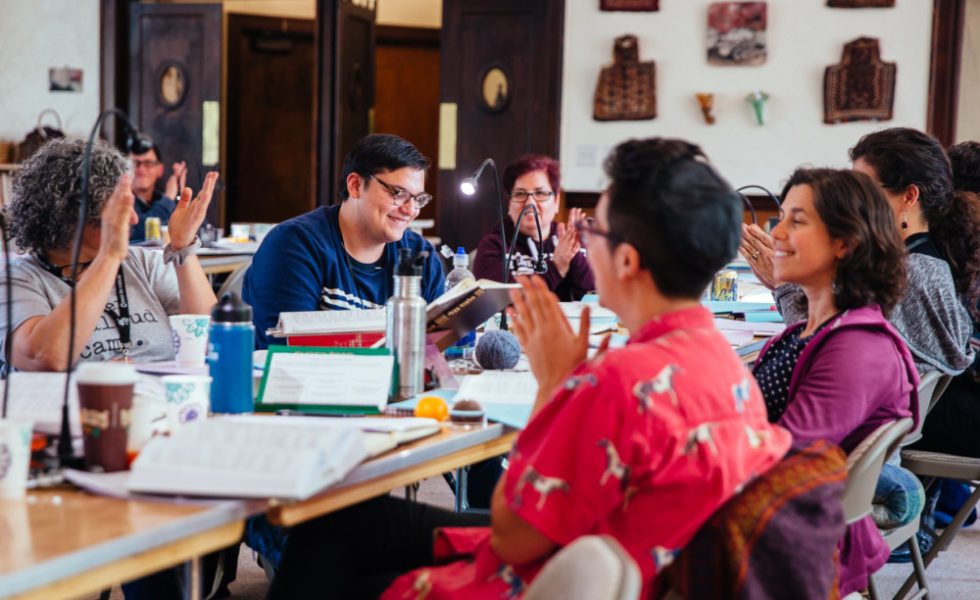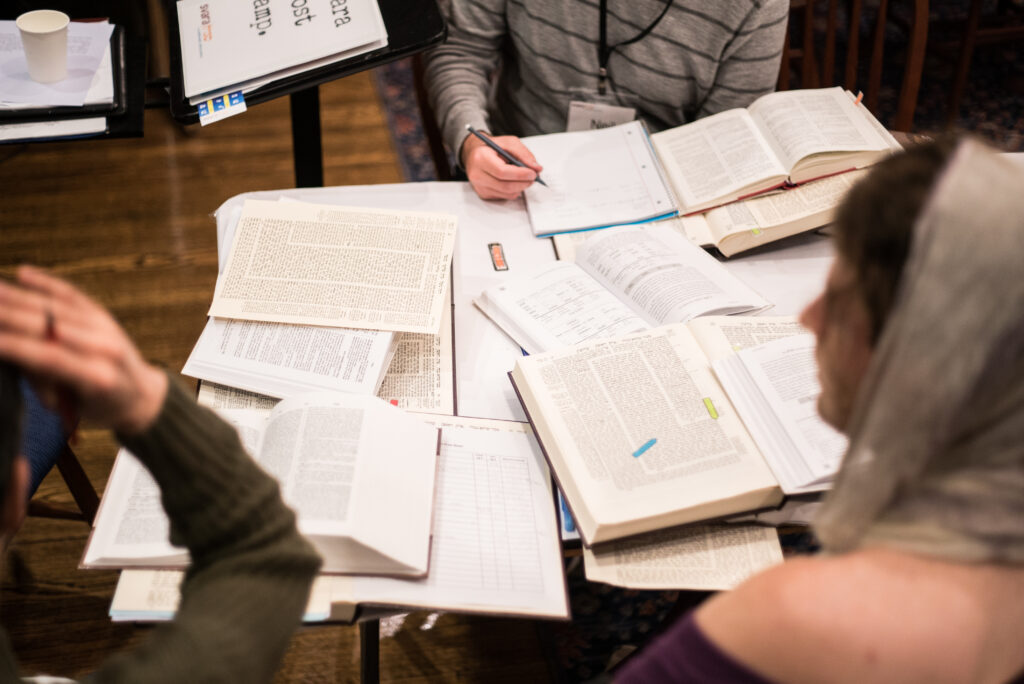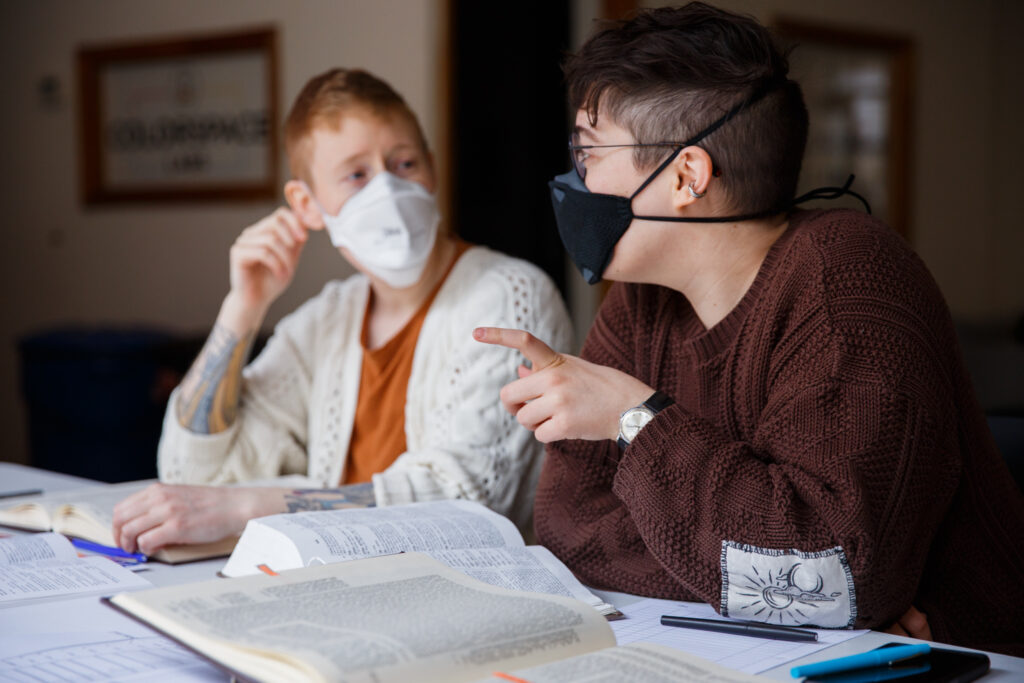If you’ve ever learned with SVARA, you’ve learned that each and every word we stumble upon deserves a close, loving, curious look. I associate this practice with learning with you in the bet midrash, bringing the fullness of ourselves to the fullness of words. Interestingly enough, this practice also reminds me of being in the forest. I remember the first time I saw a white fir tree, or rather, the first time the name “white fir” was defined for me. I was in school, getting my forestry degree, and over the summer we were in a field program in the Sierras. Our professor gathered us around and started giving us the stats of yet another species to memorize:
Latin name: Abies Concolor
Leaves: short and spiraled around the shoot, but stretched out horizontally so the branches look ‘flat’ versus pointed up or drooped.
Bark: Rough, white
Cones: Small and hidden
Over a decade later, whenever I encounter a white fir tree and tell someone what it is, I remember who was standing next to me when I identified it for the first time. I remember where I was and what we were whispering about. I remember how the teacher spoke negatively about the tree; in that moment, through a forester’s eyes, it was the least coveted tree in the woods. It’s a tree that sprouts very easily and “wins the day” against others, threatening to make a forest too dense and prone to dangerous fires. It isn’t valuable for timber (most likely used for Christmas trees) and the inside of it smells like urine, which is how it unlovingly acquired the name “piss fir.” I remember a prank where my friend hid a slice of a white fir under my bed and made our whole room smell, setting off a chain reaction of pranks between us. I remember the first time we bored a hole in this type of tree, and when the sap spilled out we dared each other to drink it. We assigned Abies Concolor a personality: mischievous, domineering, boring: your basic bitch tree that’s taking up way too much space.
I think about the many moments in my ecological training when we were introduced to facts, labels, categories of species, processes, and relationships among trees in the forest. Soon enough, this learning melded with our own stories, experiences, and dreams. We held on to certain stories about these trees, and I can’t help but wonder how many stories weren’t present in my learning. How might my learning have changed if I had been introduced to these trees, plants, and forest stands differently? The lens I used to learn about any given tree species was a particular one: I was in a forestry program concerned with what would keep the forest diverse, “healthy” as some defined it, and productive for timber. These concerns originated in a field characterized primarily of white cis men. I wonder what it would have been like to first learn about a white fir from an artist, from a biologist, from one of the Miwok people indigenous to that land, or from a friend that lugged one to their house and decorated it with twinkling lights and ornaments.
At SVARA, we say we are bringing Talmud to the 99%. And how do we do it? We start by looking up and defining a lot of words. We try to stay “inside” the space of defining a word for a really long time, even if we think we know what the word means. We explore all the definitions of a root, we go on “vide” journeys (when Jastrow suggests you go look at another similar word), and we gladly tumble down rabbit holes of associations. If you’ve ever studied at SVARA, you might have learned two things: that the word for “to say” means ‘to join’, and that most words usually mean “to join” when you get to the root of it.
This begs the question: is a bunch of queers looking up words in a dictionary a Talmud revolution? Our very definitions of words are filled with our own memories and the stories we tell about them. If we insist that people on the margins need to create and share their definitions of words, then it will radically change what the words mean, how they come together, and how they expand into all of our lives. This practice is the most Rabbinic thing ever. If you’ve ever explored a kra proof with SVARA, you know that the radical moves of the Rabbis often involve word play. They free associate the heck out of what they see in the Torah and encode more meaning into the words. They twist and flip and deepen their definitions, leaving us with glorious page after glorious page of commentary.
And the most magic part of it all? The introduction to a word isn’t delivered by a teacher in the front of the room: it happens in chevruta. We work with partners to expand and bring life to our definitions of each word. While we rely on experts for support (Jastrow and his dictionary, our beloved Fairies and Teachers), that’s not where we start. We start with multiple definitions and multiple players defining each word together. We start by bringing ourselves fully to the text in front of us. We start by challenging our teachers, and we even learn how to challenge Jastrow when he goes too “outside” for us (SVARA Fellow Jess Belasco describes the moment when Jastrow goes too outside as a “Jastro disastro”). Learning in chevruta is about witnessing one another, witnessing ourselves, and giving life to the text in a way that is uniquely ours. What’s more magical than that?
This Elul, we’re experimenting by taking a step further in experimenting with empowered chevruta learning. We’re getting ready to hold space for you and your chevrutas to learn, thrive, sharpen, and dazzle yourselves with your own brilliant and radical reads of the text. We are excited to give you all of SVARA’s goodies so you can grab your chevruta, get these words, and fly. We’ll be here to flutter in and help, but the journey, the learning, and the words will be yours. Stay tuned for more, team!
_______
Registration for SVARA’s Elul Chevruta Lovefest opens in early August. We can’t wait to learn with you!







